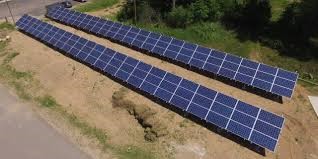
Convenience Store, Ground Mount installation in the Sokaogon Chippewa Reservation, Forest County, WI.
Source: Credit to Sokaogon Chippewa Community
| Project Name | Sokaogon Chippewa Community (SCC) Solar Project |
|---|---|
| Location | Nashville, Wisconsin |
| Project Sponsor / Borrower | Sokaogon Chippewa Community |
| Program Areas |
|
| Value Capture Techniques | Solar Energy Use & Right-of-Way Use Agreements |
| Mode | Other: Solar Farm |
| Description | Located in Nashville, Wisconsin, the 4,904-acre Mole Lake Indian Reservation is home to 500 tribal members of the Sokaogon Chippewa Community (SCC). An additional 1,000 members live off the Reservation. To strengthen the tribe’s energy independence and promote the use of impact-free sustainable technologies, the Department of Energy awarded the community with a tribal clean energy initiative grant. The funds were intended to help plan and install a community-wide solar system estimated to produce 606 kilowatts (kW) of carbon-free clean energy, which would power 17 tribal buildings and three residential homes. In 2016, the tribe collaborated with SunVest Solar in subcontracting as the investor to oversee the use of tax credits and other financial obligations not covered under D.O.E. funding. SunVest is a current Electric to install solar photovoltaic panels at selected facilities, approximately 12 to 15 tribal buildings and potentially certain tribal residential units in Forest County, Wisconsin. The U.S. Department of Energy and the Department of Housing and Urban Development awarded SunVest Solar with a $1.1 million grant to cover the installation, plus training and the creation of job opportunities for tribal members. Project installations ranged in size from 5.3 kW to 105.7 kW, including a mix of aluminum rooftop mounting systems and ground mount aluminum racking systems. While preliminary estimates indicated offsets of energy consumption ranging from 3.2 percent to 103 percent, they were calculated to be less after one year. This solar project allows the SCC to lower its carbon footprint, and also its environmental footprint associated with other emissions from coal-fired power plants, especially SO2 and mercury. The project services 12-15 of 33 more substantial energy-using buildings and nearly seven percent of the total energy load on the Reservation, reducing greenhouse gas emissions by 542 metric tons per year. |
| Cost | $2.15 million (D.O.E. grant funding offset $1 million with SCC and investor obligated to a remaining cost share of $1.152 million that would make use of tax credit options as repayment). |
| Funding Sources |
|
| Project Delivery / Contract Method | Design-build (the agreement includes fixed fee, warranties, insurance, technical requirements [including roof analysis], Federal grant requirements, and indemnities) |
| Private Partner | N/A |
| Project Advisors / Consultants |
|
| Lenders | N/A |
| Duration / Status | The initial Trail raised $4 million from 2003-2004 for preliminary design studies and concepts. After further private and public contributions, the Trail’s ground-breaking took place in 2007 and in May 2013, the construction was completed, and the official grand opening occurred. The expansion’s design process is scheduled for completion in 2020, with construction ending in 2022. |
| Financial Status / Financial Performance | Project construction began in July of 2016 and was completed in December of 2017. |
| Innovations |
|
| Related Links / Articles |
|
| Contacts | Tim Murphy Kirk Kindred |